The Bill Comes Due:
Registering Dissent on Your Dollars
By Gar Smith
November 28, 2005

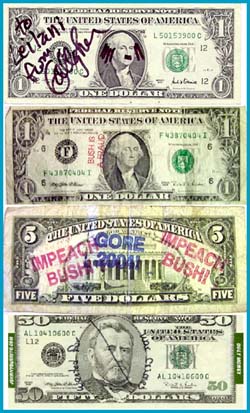 |
| A Gallagher Dollar, "Bush Is a Fraud," "Impeach Bush," and US Grant is "Wanted for War Crimes." |
The newest lines in the free speech battle are being drawn -- on dollar bills.
Political protest has traditionally been confined to picket signs, buttons, bumper stickers and the occasional creatively defaced public billboard. But as the war in Iraq drags on, opponents of the regime in Washington have found a new place to vent their anger, rage, despair... and creativity.
The next time the clerk at the local deli or supermarket hands you a wad of change, take a closer look: You may be holding some "Bush Bills."
Bush Bills are generally $1 bills that have been altered in some fashion to register a public dissent against the policies of the Bush Administration. While the traditional weapons of street-marchers and rally leaders are placards, banners, flags and bullhorns, the tool of today's cutting-edge dissident is a felt-tip pen.
In 1917, Lenin advised disheartened Russian soldiers to "Vote with your feet." In 2005, many disenchanted Americans are choosing to "vote with their bucks" -- speaking truth to power by inscribing scathing slogans on their folding money. Some of the statements appearing with greater currency on our currency are: "No War," "Impeach Bush/Cheney," "No Blood for Oil," and "Buck Fush."
Bush Bills follow in a tradition that was already well established by feminists, atheists and Native American activists.
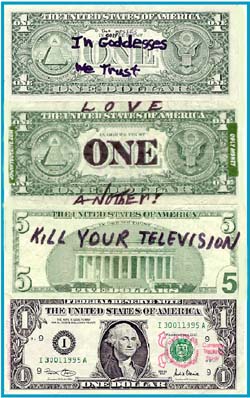 |
A few opinions from the back of America's Dollar Bill-boards. (And a "WheresGeorge.com" tracked bill.) In the words of Swami Beyondananda: "As it's become increasingly clear that only money talks in America, what better way to circulate a message the media has ignored?"
|
Free Speech Only Costs a Dollar
Check the backside of your greenbacks and you may find that the phrase "In God We Trust" has been altered. The phrase may be crossed out entirely or subjected to a partisan edit. Feminists routinely refine the slogan to read: "In Goddesses We Trust."
Some atheists prefer changing the statement to read: "In Ourselves We Trust." Some $5 bills are now circulating with the phrase "In God We Trust" crossed out by a rubber-stamped message that insists: "No 'WE' don't. It's all just superstition."
Money that has been "tagged" with political graffiti is called "secularized" and people who alter singles are called "Georgers." Dollar-dissenters were originally dubbed "Georgers" because of the portrait of George Washington on the $1 bill. With the proliferation of Bush Bills, the word has been expanded to refer to that other George -- George W. Bush.
Georgers aren't limited to dollar bills. One Georger routinely adds a speech balloon next to Abe Lincoln's profile on every five-dollar bill that comes his way. Inside the balloon, he carefully inscribes the message: "The GOP is no longer my party!" A California masseuse named Kat, scrawls "No Blood for Oil" on the backs of her bucks.
Many Native Americans still have not forgiven President Andrew Jackson for the forced relocation of the Cherokee Nation and the resulting tragedy of the "Trail of Tears." This explains why some $20 bill's bearing Jackson's likeness also carry the word "Shame" scrawled across Old Hickory's face.
Bill-branding is an art form that's within the reach of anyone. "I go for the single stroke with a good, black Sharpie," says a female Georger whose pen-name is "Hazel-rah." A dollar-dissenter known as "The Bearded One" confesses: "I've been 'defacing' my paper currency for about a year now. I just cross out the word 'god' and write below, the word 'Darwin' ... I keep doing it mostly to show that gods have no place on our money."
Bush Bills are the latest in a long tradition of contrarians who've found a way to cash in on a novel form of "viral" advertising -- a low-cost yet high-impact means of spreading a message.
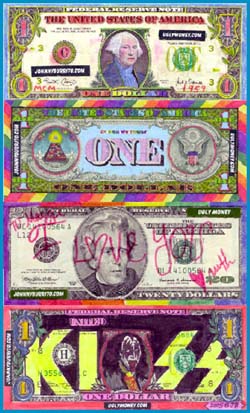 |
| In the hands of anonymous artists, plain-Jane US Currency becomes a thing of beauty. (Gene Simmons for President!) |
But Isn't It Illegal? Well... No!
But isn't it illegal to deface our national currency? Well, if it were, the Feds would have to send out a Humvee filled with armed agents to arrest Gallagher. The famous "prop comic" (who delights audiences with stunts like bashing watermelons with a sledgehammer) likes to respond to requests for his autograph by signing dollars. Gallagher not only signs his name, he also draws a Gallagher-like moustache and wig on the profile of George Washington.
Fortunately, Gallagher doesn't have to worry about the Secret Service busting down his door at 4am. It turns out that there is no US law specifically prohibits "Georging" a dollar. While it would be against the law to write "$5" on a $1 bill (that constitutes counterfeiting for profit), the Web site, lawforkids.org, gleefully assures America's leaders-of-tomorrow that "it is not against the law to draw giant red lips on George Washington's portrait on the front of a One Dollar Bill."
Title 18, Section 333 of the US Code targets anyone who "mutilates, cuts, disfigures, perforates, unites or cements together" a Federal Reserve note "with the intent to render such item(s) unfit to be reissued." The maximum fine is a $100 fine and six months in prison. Of course neither Georgers nor Bush Billers intend to render dollars unfit to circulate -- that would defeat the whole purpose.
Besides, as MSNBC Senior Producer John W. Schoen reminds us: "it's not the government's money, it's yours." The law is unambiguous: the Bill of Rights clearly protects the rights of bill-writers.
Ironically, bill defacement is now officially government policy. When's the last time you saw a clerk at a check-out counter grab a special anti-counterfeiting pen and draw a line across the face of a new $20 bill? And when's the last time you heard of one of these clerks being frog-marched out of a Wal-Mart by the Secret Service? Bill-defacement has become as American as tamale pie.
Oddly enough, there is a law forbidding the defacing of US coins. You can draw a moustache and Groucho glasses on Abe Lincoln without fear but woe betide you should some Treasury agent catch you in the act of drilling a hole in a quarter.
Billwinkle the Georger
Some "Georgers" apparently tag dollars for the same reason that kids spray their names on the sides of freight trains. "If you see a bill with 'God' scribbled out and 'Ourselves' written underneath it, that would be my doing," boasts a fellow who calls himself "Swishy McJackass."
The popularity of "Bush Bills" seems to be growing in lockstep with the nation's mounting energy bills, soaring deficits and daily combat deaths. "It's the latest form of Bush-bashing and it's one of the best because it's so easy and so ubiquitous," says one political graffiti artist who goes by the name "Billwinkle."
Dollars have built-in mobility, Billwinkle points out. Unlike a political leaflet, which can be wadded up and tossed in a trashcan, a "political bill-let" quickly travels all over the country -- and back again. Many "Georgers" are reportedly middle-aged or elderly troublemakers who make a point of spending their money at gas stations and Wall-Marts, guaranteeing that the bills will pass quickly through the cash registers and into purses and wallets.
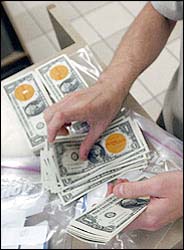 |
| Corporate bill-defacement! Stickers advertising a TV show are affixed to piles of crisp singles. Credit: New York Times photo by Erik S. Lesser. |
Ad Valorum
And then there's the recent outbreak of "commercial defacement" of US currency. You might think that placing ads on US dollars would be considered the worst form of "defacement" but, according to a 1995 VISA survey, you would be wrong. A VISA poll found that 35% of those surveyed endorsed the idea of selling ad-space on bills -- if the profits were used to pay off the federal deficit.
Television was one of the first industries to capitalize on our paper capital. In January 2004, the Media Kitchen, a New York ad agency, slapped adhesive ads for the USA Network onto 50,000 bills. GoGorilla, a guerilla-marketing agency, then quietly slipped the bills into tills in bars in LA and New York. The stickers advertised the debut of "Traffic: The Miniseries," USA Network's three-part series on drug dealing. The ad agency defended the match by pointing out that you can't have drug dealing without dollars.
"People talk about the Internet or word-of-mouth," Media Kitchen CEO Paul Woolmington told CNN, "but given the way it circulates, money is the most viral medium there is. We estimate that each bill will touch 25 to 40 hands."
NBC has also run a "currency piggy-back campaign." In October, NBC promoted it's new TV show, The Heartland, by pasting large yellow promotional ads on 150,000 dollar bills and placing them in circulation in 15 cities -- including New York, Los Angeles, Nashville, Salt Lake City, Des Moines and Milwaukee. The stickers carried the message "What's your wish?" and an invitation to watch the TV show. NBC Vice President of Marketing and Special Projects Barbara Blangiardi had a confession: "The Christian community was a target audience."
Ban the Bill?
With an estimated 8 billion $1 bills in circulation, Bush Bills promise to make an indelible impression smack in the middle of the cash economy. With the proliferation of Bush Bills, the US economy is being literally transformed into a visible "marketplace of ideas."
Bush Bills have built-in staying-power since the average circulation life of dollar is 18 to 22 months. Turning a fiver into a Bush Bill buys you around two years' of circulation. A ten-spot generally lasts three years. A twenty is good for four years and a fifty will get you nine. But for the best rapid-return on your investment, the $1 bill is by far the best advertising vehicle in the history of ink-and-paper.
While Georging a bill with a heart-felt statement of opinion doesn't devalue the currency (that's been the job of the Bush administration), at some point, it is conceivable that an increasingly embattled White House might want to eliminate this embarrassing public demonstration of rebellion. But what can the White House do to combat the increasing currency of Bush Bills? Short of buying them up and burning them up, very little.
The White House could order the seizure, incineration and replacement of any dollars tainted with stains of dissent. But requiring a "political recall" of Bush Bills could prove a costly undertaking. Although it only costs a nickel to produce each new dollar, MSNBC reports that the US Bureau of Engraving and Printing churns out around 37 million notes a day -- and that adds up to a pretty good chunk of change. And it hardly seems worth the effort, since the useful life of a well-circulated dollar bill is less than two years.
Some of the Bush Bills in circulation today will still be changing hands long after the current administration is retired from office or, in some cases, still serving sentences in Federal prisons.
"Bush Bills are a great outlet for citizens who feel their country has been taken away from them," contends Billwinkle, the self-confessed dollar-defacer. "We aren't powerless. This is supposed to be a nation of, by and for the people. Each time I write 'Visualize Impeachment' on a crisp new single, I feel empowered."
This may be the most accessible form of protest in the long history of civil dissent. While it takes 37 cents to mail an indignant letter to the White House, it only takes a few seconds to turn an ordinary dollar into a Bush Bill.
"It's my way of 'sending a message' to the neo-cons and fundamentalist Christocrats," Billwinkle explains in an email message. "Even if they don't accept my message, they're going to have to accept my dollar."
As the battle between Blue State and Red State sensibilities plays itself out on the Green Slate of our common currency, it may actually help draw us together as a nation. At the very least, the full political spectrum of Americans can freely engage in the common sport of drawing competing pictures of doves and Blackhawks on dollar bills.
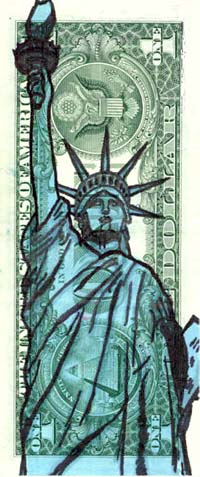 |
| It's your money: Draw your own conclusions. |
A New Way to Buck the Neo-con Trend
As the Bush Bill protest spreads, our dollars will slowly darken with accumulating jottings of angry ink. The shocking images of Iraqi prisoners in Abu Ghraib -- hooded, naked, beaten, humiliated and murdered -- has left an indelible stain on the face of America. This black stain now appears to be seeping onto our very currency.
In his oath of office, George W. Bush didn't promise to wage an unending war on terrorism: He swore to "protect and defend the Constitution from enemies domestic and foreign." With the extension of the USA PATRIOT Act, it is the Constitution, not Al Qaeda, that sits in the Bush/Cheney cross-hairs.
It is understandable that many citizens are feeling a mite disempowered these days. With so many mush-mouthed misstatements emanating from Washington, it's not surprising that people would start responding to Bush bull with Bush Bills. Electronic voting machines have turned democracy into a digital toss-up. The only way to know whether your vote really counts any more is to insist on a "paper trail." In a way, that's what Billwinkle and the rest of the country's dissident dollar-doodlers are committed to -- creating a visible and irrefutable "paper trail" of opposition that cannot be ignored.
As more Bush Bills get into circulation, the chances grow that one of these Talk-back Greenbacks will wind up in the hands of George W. Bush. Whether that day comes next month or next year, these beleaguered bills will linger as a permanent reminder of a besmirched legacy -- a testy testament to the illegalities of the Bush/Cheney Era. And when that first Bush Bill winds up in the hands of the Demander-in-chief, he'll get the message loud and clear: "The bill has come due."
Gar Smith is Editor Emeritus of Earth Island Journal, editor of The-Edge and a co-founder of Environmentalists Against War.
For more information contact:







